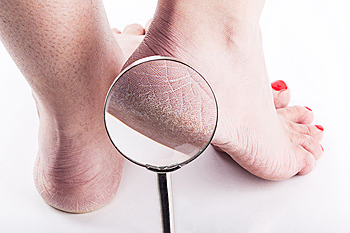Blog
Are Cracked Heels a Common Foot Condition?
 The foot condition that is known as cracked heels is fairly common among the majority of people. It is defined as dry skin that begins on the edge of the heel, and may advance to deep cracks, or fissures developing in the entire heel area. It can occur from genetic factors, or from wearing shoes that have an open back, which provide inadequate support. Additional reasons why cracked heels may develop can include obesity and the normal aging process.This ailment can be treated by thoroughly washing and drying the feet daily, followed by using a good moisturizer several times per day. If the heels are severely dry and become infected, it is advised that you speak to a podiatrist who can guide you toward proper treatment options and recommend preventative methods.
The foot condition that is known as cracked heels is fairly common among the majority of people. It is defined as dry skin that begins on the edge of the heel, and may advance to deep cracks, or fissures developing in the entire heel area. It can occur from genetic factors, or from wearing shoes that have an open back, which provide inadequate support. Additional reasons why cracked heels may develop can include obesity and the normal aging process.This ailment can be treated by thoroughly washing and drying the feet daily, followed by using a good moisturizer several times per day. If the heels are severely dry and become infected, it is advised that you speak to a podiatrist who can guide you toward proper treatment options and recommend preventative methods.
Cracked heels are unsightly and can cause further damage to your shoes and feet. If you have any concerns, contact Dr. Michael E. Newman from Pennsylvania. Our doctors can provide the care you need to keep you pain-free and on your feet.
Cracked Heels
Cracked heels appear unappealing and can make it harder for you walk around in sandals. Aside from looking unpleasant, cracked heels can also tear stockings, socks, and wear out your shoes. There are several methods to help restore a cracked heel and prevent further damage.
How Do You Get Them?
Dry skin is the number one culprit in creating cracked heels. Many athletes, walkers, joggers, and even swimmers suffer from cracked heels. Age and skin oil production play a role to getting cracked heels as well.
Promote Healing
Over the counter medicines can help, especially for those that need instant relief or who suffer from chronic dry feet.
Wear Socks – Wearing socks with medicated creams helps lock in moisture.
Moisturizers – Applying both day and night will help alleviate dryness which causes cracking.
Pumice Stones – These exfoliate and remove dead skin, which allows for smoother moisturizer application and better absorption into the skin.
Change in Diet
Eating healthy with a well-balanced diet will give the skin a fresh and radiant look. Your body responds to the kinds of food you ingest. Omega-3 fatty acids and zinc supplements can also revitalize skin tissue.
Most importantly, seek professional help if unsure how to proceed in treating cracked heels. A podiatrist will help you with any questions or information needed.
If you have any questions, please feel free to contact one of our offices located in Plymouth Meeting and Ambler, PA. We offer the newest diagnostic and treatment technologies for all your foot care needs.
Read more about Solutions for Cracked HeelsWhy Live with Pain and Numbness in Your Feet?
Possible Causes of Plantar Fasciitis
 Patients who have high arches may be prone to developing a painful condition that is known as plantar fasciitis. This condition occurs when the band of tissue that is located on the sole of the foot becomes torn or inflamed. This band is referred to as the plantar fascia, and its purpose is to connect the heel bone to the toes. Plantar fascia can play a significant role in maintaining balance in the body, and can affect normal walking. This condition can appear for several reasons, including genetic factors, exercising on hard surfaces, and wearing shoes that do not provide adequate support. Pain is typically felt in the morning upon arising, but may improve as walking begins. Mild relief may be obtained when shoes are worn that have proper support, and through gentle stretches that are designed to improve flexibility. It is strongly suggested that you consult with a podiatrist as quickly as possible if you suffer from plantar fasciitis, so the correct treatment can begin.
Patients who have high arches may be prone to developing a painful condition that is known as plantar fasciitis. This condition occurs when the band of tissue that is located on the sole of the foot becomes torn or inflamed. This band is referred to as the plantar fascia, and its purpose is to connect the heel bone to the toes. Plantar fascia can play a significant role in maintaining balance in the body, and can affect normal walking. This condition can appear for several reasons, including genetic factors, exercising on hard surfaces, and wearing shoes that do not provide adequate support. Pain is typically felt in the morning upon arising, but may improve as walking begins. Mild relief may be obtained when shoes are worn that have proper support, and through gentle stretches that are designed to improve flexibility. It is strongly suggested that you consult with a podiatrist as quickly as possible if you suffer from plantar fasciitis, so the correct treatment can begin.
Plantar fasciitis can be very painful and inconvenient. If you are experiencing heel pain or symptoms of plantar fasciitis, contact one of our podiatrists from Pennsylvania. Our doctors can provide the care you need to keep you pain-free and on your feet.
What Is Plantar Fasciitis?
Plantar fasciitis is the inflammation of the thick band of tissue that runs along the bottom of your foot, known as the plantar fascia, and causes mild to severe heel pain.
What Causes Plantar Fasciitis?
- Excessive running
- Non-supportive shoes
- Overpronation
- Repeated stretching and tearing of the plantar fascia
How Can It Be Treated?
- Conservative measures – anti-inflammatories, ice packs, stretching exercises, physical therapy, orthotic devices
- Shockwave therapy – sound waves are sent to the affected area to facilitate healing and are usually used for chronic cases of plantar fasciitis
- Surgery – usually only used as a last resort when all else fails. The plantar fascia can be surgically detached from the heel
While very treatable, plantar fasciitis is definitely not something that should be ignored. Especially in severe cases, speaking to your doctor right away is highly recommended to avoid complications and severe heel pain. Your podiatrist can work with you to provide the appropriate treatment options tailored to your condition.
If you have any questions please feel free to contact one of our offices located in Plymouth Meeting and Ambler, PA . We offer the newest diagnostic and treatment technologies for all your foot and ankle needs.
Possible Causes of Plantar Fasciitis
 Patients who have high arches may be prone to developing a painful condition that is known as plantar fasciitis. This condition occurs when the band of tissue that is located on the sole of the foot becomes torn or inflamed. This band is referred to as the plantar fascia, and its purpose is to connect the heel bone to the toes. Plantar fascia can play a significant role in maintaining balance in the body, and can affect normal walking. This condition can appear for several reasons, including genetic factors, exercising on hard surfaces, and wearing shoes that do not provide adequate support. Pain is typically felt in the morning upon arising, but may improve as walking begins. Mild relief may be obtained when shoes are worn that have proper support, and through gentle stretches that are designed to improve flexibility. It is strongly suggested that you consult with a podiatrist as quickly as possible if you suffer from plantar fasciitis, so the correct treatment can begin.
Patients who have high arches may be prone to developing a painful condition that is known as plantar fasciitis. This condition occurs when the band of tissue that is located on the sole of the foot becomes torn or inflamed. This band is referred to as the plantar fascia, and its purpose is to connect the heel bone to the toes. Plantar fascia can play a significant role in maintaining balance in the body, and can affect normal walking. This condition can appear for several reasons, including genetic factors, exercising on hard surfaces, and wearing shoes that do not provide adequate support. Pain is typically felt in the morning upon arising, but may improve as walking begins. Mild relief may be obtained when shoes are worn that have proper support, and through gentle stretches that are designed to improve flexibility. It is strongly suggested that you consult with a podiatrist as quickly as possible if you suffer from plantar fasciitis, so the correct treatment can begin.
Plantar fasciitis can be very painful and inconvenient. If you are experiencing heel pain or symptoms of plantar fasciitis, contact Dr. Michael E. Newman from Pennsylvania. Our doctors can provide the care you need to keep you pain-free and on your feet.
What Is Plantar Fasciitis?
Plantar fasciitis is the inflammation of the thick band of tissue that runs along the bottom of your foot, known as the plantar fascia, and causes mild to severe heel pain.
What Causes Plantar Fasciitis?
- Excessive running
- Non-supportive shoes
- Overpronation
- Repeated stretching and tearing of the plantar fascia
How Can It Be Treated?
- Conservative measures – anti-inflammatories, ice packs, stretching exercises, physical therapy, orthotic devices
- Shockwave therapy – sound waves are sent to the affected area to facilitate healing and are usually used for chronic cases of plantar fasciitis
- Surgery – usually only used as a last resort when all else fails. The plantar fascia can be surgically detached from the heel
While very treatable, plantar fasciitis is definitely not something that should be ignored. Especially in severe cases, speaking to your doctor right away is highly recommended to avoid complications and severe heel pain. Your podiatrist can work with you to provide the appropriate treatment options tailored to your condition.
If you have any questions please feel free to contact one of our offices located in Plymouth Meeting and Ambler, PA. We offer the newest diagnostic and treatment technologies for all your foot and ankle needs.
Read more about Plantar Fasciitis
